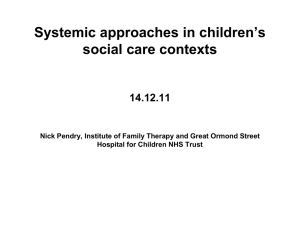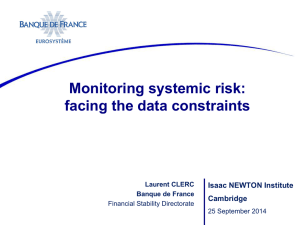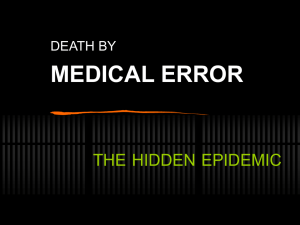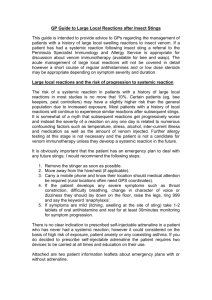Program for Masterclass in Family therapy (5
advertisement
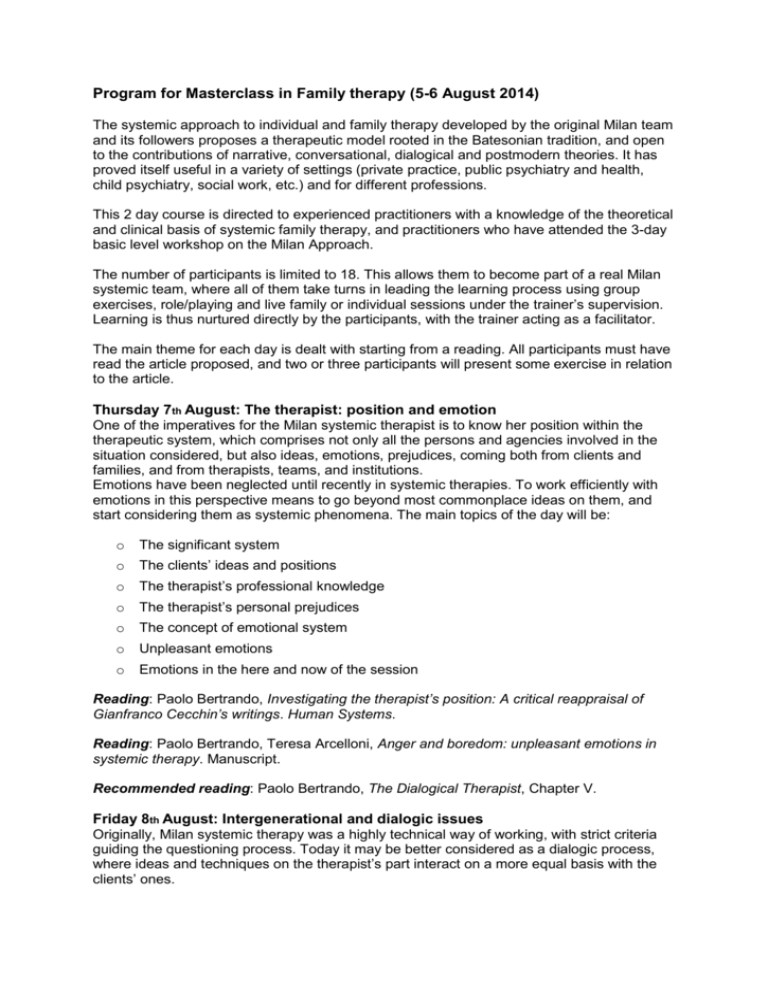
Program for Masterclass in Family therapy (5-6 August 2014) The systemic approach to individual and family therapy developed by the original Milan team and its followers proposes a therapeutic model rooted in the Batesonian tradition, and open to the contributions of narrative, conversational, dialogical and postmodern theories. It has proved itself useful in a variety of settings (private practice, public psychiatry and health, child psychiatry, social work, etc.) and for different professions. This 2 day course is directed to experienced practitioners with a knowledge of the theoretical and clinical basis of systemic family therapy, and practitioners who have attended the 3-day basic level workshop on the Milan Approach. The number of participants is limited to 18. This allows them to become part of a real Milan systemic team, where all of them take turns in leading the learning process using group exercises, role/playing and live family or individual sessions under the trainer’s supervision. Learning is thus nurtured directly by the participants, with the trainer acting as a facilitator. The main theme for each day is dealt with starting from a reading. All participants must have read the article proposed, and two or three participants will present some exercise in relation to the article. Thursday 7th August: The therapist: position and emotion One of the imperatives for the Milan systemic therapist is to know her position within the therapeutic system, which comprises not only all the persons and agencies involved in the situation considered, but also ideas, emotions, prejudices, coming both from clients and families, and from therapists, teams, and institutions. Emotions have been neglected until recently in systemic therapies. To work efficiently with emotions in this perspective means to go beyond most commonplace ideas on them, and start considering them as systemic phenomena. The main topics of the day will be: o The significant system o The clients’ ideas and positions o The therapist’s professional knowledge o The therapist’s personal prejudices o The concept of emotional system o Unpleasant emotions o Emotions in the here and now of the session Reading: Paolo Bertrando, Investigating the therapist’s position: A critical reappraisal of Gianfranco Cecchin’s writings. Human Systems. Reading: Paolo Bertrando, Teresa Arcelloni, Anger and boredom: unpleasant emotions in systemic therapy. Manuscript. Recommended reading: Paolo Bertrando, The Dialogical Therapist, Chapter V. Friday 8th August: Intergenerational and dialogic issues Originally, Milan systemic therapy was a highly technical way of working, with strict criteria guiding the questioning process. Today it may be better considered as a dialogic process, where ideas and techniques on the therapist’s part interact on a more equal basis with the clients’ ones. Genograms and investigations on families of origins are considered tools pertaining to the intergenerational wing of family therapy. Systemic therapy, though, works on them after abandoning its initial emphasis on the present: intergenerational systemic therapy involves a general reconsideration of time issues in therapy. The main topics of the day will be: o o o o o o Dialogues and systems Systemic questions and the dialogic process Hypotheses as dialogues The genogram in systemic therapy Investigating the generations The reflexive loop of past, present and future Reading: Excerpts from Boscolo, Bertrando, The times of time. Norton, 1993. Recommended reading: Paolo Bertrando, The Dialogical Therapist, Chapter X. Suggested overall reading:Paolo Bertrando (2007) The Dialogical Therapist (Karnac Books, London) Further possible readings Paolo Bertrando (2002) The presence of the third party. Systemic therapy and transference analysis. Journal of Family Therapy, 24(3): 351-368. Paolo Bertrando & Dario Toffanetti (2003) Persons and hypotheses. The use of the therapist in the therapeutic process. Australian and New Zealand Journal of Family Therapy, 24(1): 713. Luigi Boscolo, Gianfranco Cecchin, Lynn Hoffman, Peggy Penn, (1987) Milan Systemic Family Therapy. Conversations in Theory and Practice. New York, Basic Books. Luigi Boscolo & Paolo Bertrando (1993) The Times of Time. A New Perspective for Systemic Therapy and Consultation. New York, Norton. Luigi Boscolo & Paolo Bertrando (1996) Systemic Therapy with Individuals. London: Karnac Books. Paolo Bertrando MD, PhD, graduated in medicine and specialized in psychiatry in Milan, Italy. He was trained in systemic family therapy by Luigi Boscolo and Gianfranco Cecchin in the 1980s, and used initially the Milan Approach for working with families with a member diagnosed with schizophrenia. He later joined Boscolo and Cecchin’s Milan center for family Therapy, where he was a trainer from 1993 to 2002. In 2003, he co-founded the Episteme systemic training center, where he was director until 2012. Currently he is scientific director of the Systemic-Dialogical School in Bergamo, where he is trying to develop a brand of systemic therapy closer to a dialogical position and practice. He published several articles and books about systemic therapy. The most relevant are the two books co-written with Luigi Boscolo, The Times of Time (New York, Norton, 1993), and Systemic Therapy with Individuals (London, Karnac Books, 1996). His latest book published in 2007 is The Dialogical Therapist (London, Karnac Books). His next book, Emotions and the Therapist, is due for publication early in 2015. Dr. Bertrando has travelled widely holding workshops and seminars on several topics related to systemic therapy, in Italy, Spain, Norway, Denmark, Greece, United Kingdom, Ireland, Chile, Colombia, Mexico, Singapore, New Zealand and Australia. His present interests concern the dynamics of systemic therapy (both from a methodological and experimental point of view), the relationship between psychiatric and systemic thinking, and the dynamics of emotions according to a systemic view.

